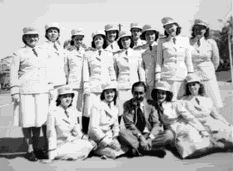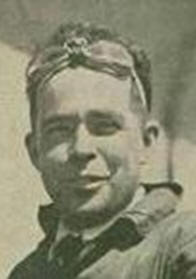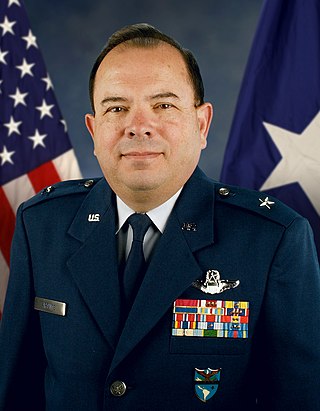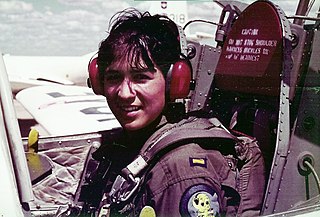
United States Army Garrison Fort Buchanan, is a United States Army installation in Puerto Rico. It is located in the metropolitan area of the capital, San Juan.

The Puerto Rico campaign was the American military sea and land operation on the island of Puerto Rico during the Spanish–American War. The offensive began on May 12, 1898, when the United States Navy attacked the capital, San Juan. Though the damage inflicted on the city was minimal, the Americans were able to establish a blockade in the city's harbor, San Juan Bay. On June 22, the cruiser Isabel II and the destroyer Terror delivered a Spanish counterattack, but were unable to break the blockade and Terror was damaged.

Second Lieutenant Carmen Maria Lozano Dumler, RN,, was one of the first Puerto Rican women to become a United States Army officer. During World War II, she served as a nurse and interpreter, and provided support for patients who spoke Spanish. Lozano Dumler has since been featured in promotional and recruitment materials that celebrate diversity in the US military.

The recorded military history of Puerto Rico encompasses the period from the 16th century, when Spanish conquistadores battled native Taínos in the rebellion of 1511, to the present employment of Puerto Ricans in the United States Armed Forces in the military campaigns in Afghanistan and Iraq.

United States Marine Corps Women's Reserve (Reserve) was the World War II women's branch of the United States Marine Corps Reserve. It was authorized by the U.S. Congress and signed into law by President Franklin D. Roosevelt on 30 July 1942. Its purpose was to release officers and men for combat, and to replace them with women in U.S. shore stations for the duration of the war plus six months. Ruth Cheney Streeter was appointed the first director. The Reserve did not have an official nickname as did the other World War II women's military services.

Lewis G. Lee is a retired United States Marine who served as the 13th Sergeant Major of the Marine Corps from 1995 to 1999. He retired from active duty in 1999 after over 31 years of service. He was the last Sergeant Major of the Marine Corps to serve in combat in the Vietnam War.

Félix Rigau Carrera, known as El Águila de Sabana Grande, was the first Puerto Rican pilot and the first Puerto Rican pilot to fly on air mail carrying duties in Puerto Rico.

Angela Salinas is a retired major general in the United States Marine Corps. She was the first woman to command a Marine Corps Recruit Depot, and the first Hispanic woman to become a general in the Marines.
Two of the least-known roles played by Puerto Rican women and women of Puerto Rican descent have been that of soldier and that of revolutionary. This is a brief account of some the Puerto Rican women who have participated in military actions as members of either a political revolutionary movement or of the Armed Forces of the United States.

Brigadier General Ricardo "Rico" Aponte is a United States Air Force officer who was the first Hispanic director, J-7, of the United States Southern Command, located in Miami, Florida.

Puerto Ricans and people of Puerto Rican descent have participated as members of the United States Armed Forces in the American Civil War and in every conflict which the United States has been involved since World War I. In World War II, more than 65,000 Puerto Rican service members served in the war effort, including the guarding of U.S. military installations in the Caribbean and combat operations in the European and Pacific theatres.

Captain Linda Garcia Cubero is a former United States Air Force officer, of Mexican-American-Puerto Rican descent who in 1980 was a member of the first class of women to graduate from the United States Air Force Academy. She is the first Hispanic woman to graduate from any service academy.

Hispanic Americans, also referred to as Latinos, served in all elements of the American armed forces in the war. They fought in every major American battle in the war. Between 400,000 and 500,000 Hispanic Americans served in the U.S. Armed Forces during World War II, out of a total of 16,000,000, constituting 3.1% to 3.2% of the U.S. Armed Forces. The exact number is unknown as, at the time, Hispanics were not tabulated separately, but were included in the general white population census count. Separate statistics were kept for African Americans and Asian Americans.

Ramona M. Valdez was a Dominican-born United States Marine who was killed in the Iraq War. She was posthumously honored by the U.S. Marine Corps when the II MEF Communications Training Center was dedicated as the Valdez Training Facility.
Hispanics in the United States Marine Corps, such as Private France Silva who during the Boxer Rebellion became the first Marine of the thirteen Marines of Latin American descent to be awarded the Medal of Honor, and Private First Class Guy Gabaldon who is credited with capturing over 1,000 enemy soldiers and civilians during World War II, have distinguished themselves in combat. Hispanics have participated as members of the United States Marine Corps in the Boxer Rebellion, World War I, the American intervention in Latin America also known as the Banana Wars, World War II, the Korean War, the Vietnam War, the Gulf War and most recently in the military campaigns of Afghanistan and Iraq.
Puerto Ricans and people of Puerto Rican descent have participated as members of the United States Armed Forces in every conflict in which the United States has been involved since World War I.

Fernando Luis García was a United States Marine Corps private first class who was killed in action during the Korean War and posthumously awarded the Medal of Honor for heroism above and beyond the call of duty on September 5, 1952, during the Battle of Bunker Hill (1952). He was the first of nine Puerto Rican servicemen to be awarded the Medal of Honor and is the only Puerto Rican Marine to be awarded the medal.

Lieutenant Colonel Olga E. Custodio is a former United States Air Force officer who became the first female Hispanic U.S. military pilot. She was the first Hispanic woman to complete U.S. Air Force military pilot training. Upon retiring from the military, she became the first female Hispanic commercial airline captain of American Airlines.

Irene M. Zoppi Rodríguez, is a retired U.S. Army Reserve brigadier general and academic. She was the first Puerto Rican woman ever to attain that rank in the Army Reserve. Her final assignment was deputy commanding general for United States Army South as the director of the Army Reserve Engagement Cell for Individual Mobilization Augmentees. Zoppi is an adjunct professor at Strayer University. She has worked as an instructor for the National Intelligence University where she directed the university's academic center within the National Security Agency.

















